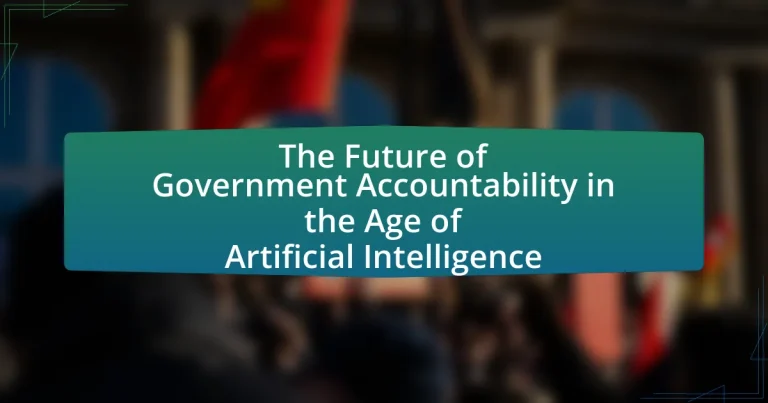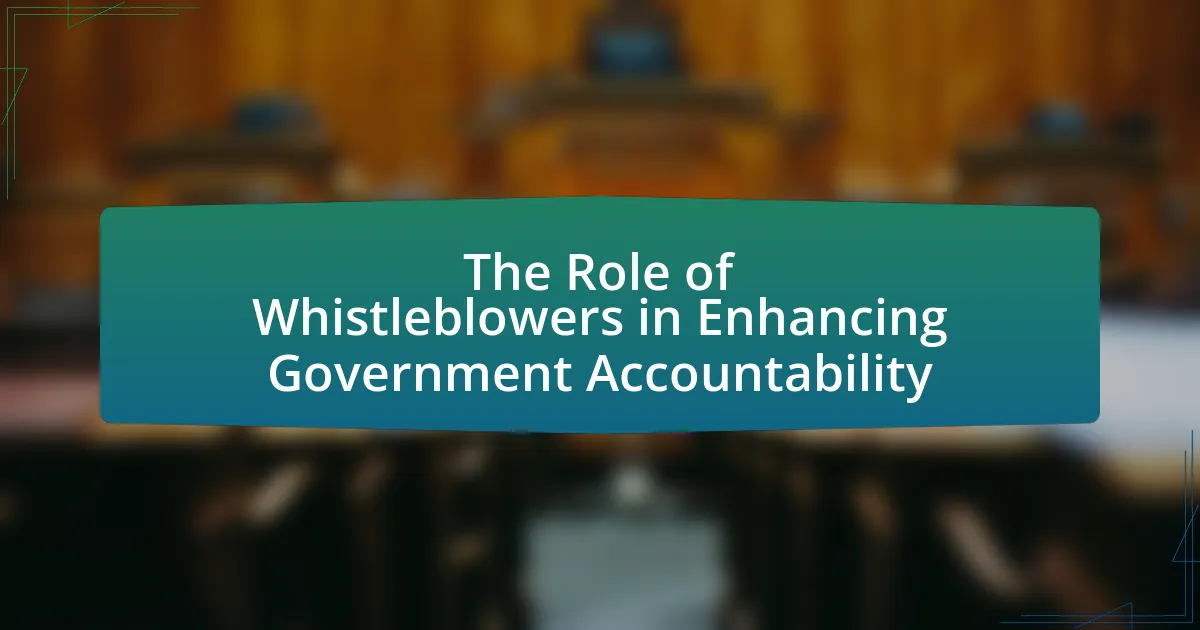Government accountability in the age of artificial intelligence (AI) encompasses the responsibility of governmental entities to maintain transparency and ethical standards in the deployment of AI technologies. The article explores how AI transforms accountability by enhancing data analysis, improving citizen engagement, and fostering transparency in government operations. It discusses the ethical concerns related to bias, privacy, and the challenges posed by AI’s complexity, which can obscure decision-making processes. Additionally, the article highlights the importance of establishing frameworks and best practices to ensure that AI governance aligns with public interests and promotes trust in governmental institutions.
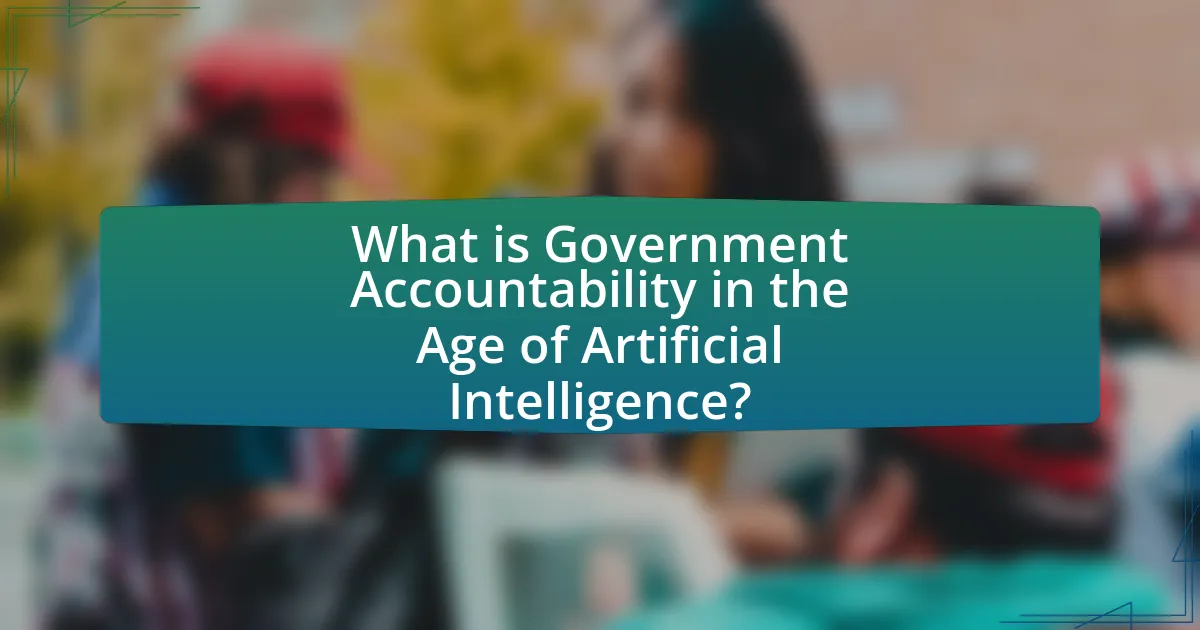
What is Government Accountability in the Age of Artificial Intelligence?
Government accountability in the age of artificial intelligence refers to the obligation of government entities to be transparent, responsible, and answerable for their actions, particularly in the deployment and regulation of AI technologies. As AI systems increasingly influence decision-making processes, governments must ensure that these technologies are used ethically and do not infringe on citizens’ rights. For instance, the European Union’s General Data Protection Regulation (GDPR) mandates that individuals have the right to understand how AI systems affect them, thereby reinforcing accountability. Additionally, frameworks like the OECD’s Principles on Artificial Intelligence emphasize the importance of transparency and accountability in AI governance, highlighting the need for clear guidelines and oversight mechanisms to hold governments accountable for AI-related decisions.
How has artificial intelligence changed the landscape of government accountability?
Artificial intelligence has significantly transformed government accountability by enhancing transparency, improving data analysis, and facilitating citizen engagement. AI technologies enable governments to process vast amounts of data efficiently, allowing for real-time monitoring of public spending and policy implementation. For instance, AI-driven analytics can identify patterns of corruption or inefficiency, leading to more informed decision-making and accountability measures. Additionally, AI tools like chatbots and automated reporting systems improve communication between governments and citizens, fostering greater public participation in governance. These advancements are supported by studies showing that AI applications in public administration can lead to a 30% increase in operational efficiency, thereby reinforcing accountability mechanisms.
What are the key features of AI that impact government accountability?
The key features of AI that impact government accountability include data transparency, predictive analytics, and automated decision-making. Data transparency allows citizens to access information about government actions and decisions, fostering trust and enabling informed public discourse. Predictive analytics enhances accountability by enabling governments to anticipate issues and allocate resources effectively, as evidenced by the use of AI in crime prediction and resource management in cities like Los Angeles. Automated decision-making can streamline processes and reduce human bias, but it also raises concerns about accountability when decisions are made without human oversight, as seen in the deployment of AI in welfare programs. These features collectively influence how governments operate and interact with citizens, shaping the landscape of accountability in the digital age.
How does AI enhance transparency in government operations?
AI enhances transparency in government operations by enabling real-time data analysis and automated reporting, which allows citizens to access information more easily. For instance, AI algorithms can process vast amounts of public data, such as budgets and spending reports, and present them in user-friendly formats, making it simpler for the public to understand government activities. Additionally, AI-driven platforms can track government performance metrics and provide insights into decision-making processes, thereby fostering accountability. A study by the World Economic Forum in 2020 highlighted that governments using AI for data transparency saw a 30% increase in public trust, demonstrating the effectiveness of AI in promoting openness in governance.
Why is government accountability important in the context of AI?
Government accountability is crucial in the context of AI because it ensures that the deployment and use of artificial intelligence technologies align with ethical standards and public interests. As AI systems increasingly influence decision-making processes in areas such as law enforcement, healthcare, and social services, accountability mechanisms are necessary to prevent misuse, discrimination, and violations of privacy. For instance, a study by the AI Now Institute highlights that without accountability, AI can perpetuate biases present in training data, leading to unfair outcomes. Therefore, establishing clear accountability frameworks helps to safeguard against these risks and promotes transparency in AI governance.
What risks does AI pose to traditional accountability mechanisms?
AI poses significant risks to traditional accountability mechanisms by obscuring decision-making processes and reducing transparency. The complexity of AI algorithms can make it difficult for stakeholders to understand how decisions are made, leading to a lack of clarity in accountability. For instance, when AI systems make autonomous decisions, it becomes challenging to identify who is responsible for those decisions, especially in cases of errors or biases. Research from the AI Now Institute highlights that the opacity of AI systems can undermine trust in public institutions, as citizens may find it hard to hold entities accountable when the rationale behind decisions is not accessible or understandable. This lack of transparency can erode public confidence and hinder effective oversight, ultimately compromising the integrity of governance.
How can AI improve citizen engagement in government accountability?
AI can improve citizen engagement in government accountability by facilitating real-time communication and feedback between citizens and government entities. Through AI-driven platforms, citizens can easily access information about government activities, report issues, and provide input on policies. For instance, chatbots can handle inquiries and gather public opinions efficiently, while data analytics can identify trends in citizen concerns, allowing governments to respond proactively. Research indicates that AI tools can enhance transparency and trust, as seen in initiatives like the City of Los Angeles’ use of AI to analyze public feedback on city services, leading to improved responsiveness and accountability.
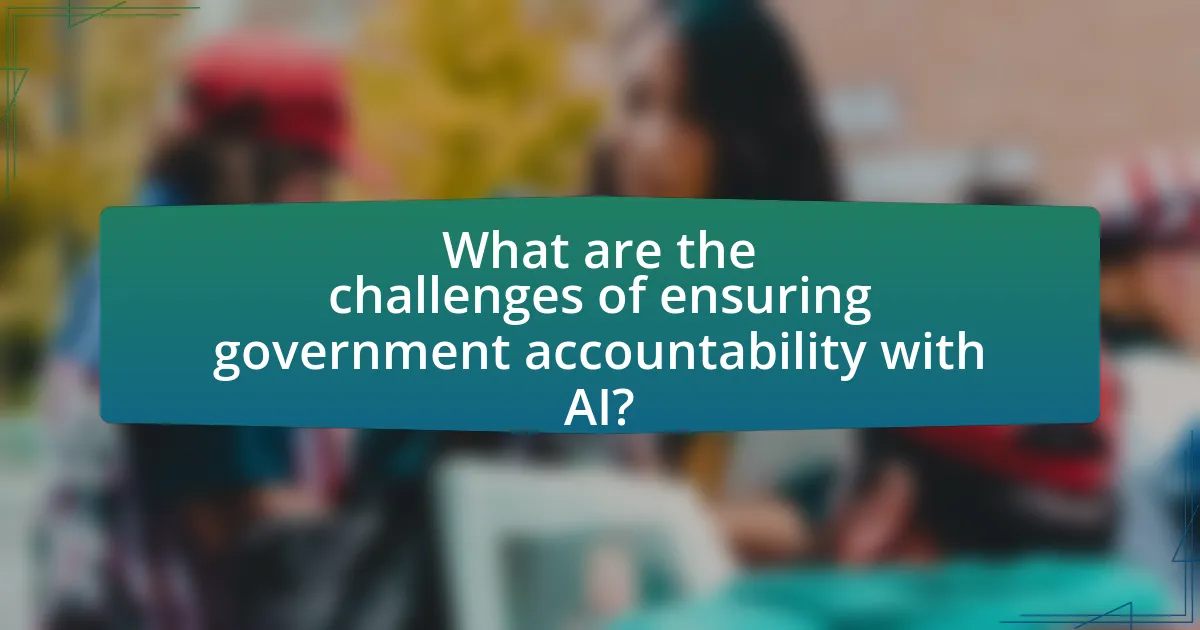
What are the challenges of ensuring government accountability with AI?
Ensuring government accountability with AI faces significant challenges, primarily due to issues of transparency, bias, and data privacy. Transparency is hindered because AI algorithms often operate as “black boxes,” making it difficult for citizens to understand how decisions are made. For instance, a study by the AI Now Institute highlights that opaque AI systems can obscure accountability, as it becomes unclear who is responsible for decisions made by these systems. Additionally, bias in AI can lead to unfair treatment of certain groups, undermining trust in government actions. Research from MIT Media Lab indicates that biased algorithms can perpetuate existing inequalities, further complicating accountability efforts. Lastly, data privacy concerns arise when governments utilize AI to analyze personal data, raising ethical questions about surveillance and consent. These challenges collectively impede the ability to hold governments accountable in an increasingly AI-driven landscape.
What ethical concerns arise from the use of AI in government accountability?
The ethical concerns arising from the use of AI in government accountability include issues of bias, transparency, and privacy. Bias in AI algorithms can lead to discriminatory outcomes, as seen in various studies indicating that machine learning models may perpetuate existing societal inequalities. Transparency is another critical concern; the opacity of AI decision-making processes can hinder public understanding and trust, as highlighted by the European Commission’s guidelines on ethical AI, which emphasize the need for explainability. Additionally, the use of AI can infringe on privacy rights, particularly when surveillance technologies are employed without adequate oversight, raising alarms about civil liberties and the potential for abuse. These ethical issues necessitate careful consideration and regulation to ensure that AI enhances rather than undermines government accountability.
How do biases in AI algorithms affect accountability outcomes?
Biases in AI algorithms significantly undermine accountability outcomes by perpetuating discrimination and skewing decision-making processes. When AI systems are trained on biased data, they can produce results that favor certain groups over others, leading to unfair treatment in areas such as law enforcement, hiring, and lending. For instance, a study by ProPublica found that a risk assessment algorithm used in the criminal justice system was biased against African American defendants, falsely flagging them as higher risk compared to white defendants. This demonstrates how biased algorithms can lead to unjust outcomes, eroding public trust and accountability in institutions that rely on these technologies.
What measures can be taken to mitigate ethical risks in AI applications?
To mitigate ethical risks in AI applications, organizations should implement robust ethical guidelines and frameworks. Establishing clear ethical standards helps ensure that AI systems are designed and deployed responsibly, addressing issues such as bias, transparency, and accountability. For instance, the European Union’s General Data Protection Regulation (GDPR) emphasizes the importance of data protection and user consent, which can guide ethical AI practices. Additionally, conducting regular audits and impact assessments can identify potential ethical concerns early in the development process, allowing for timely adjustments. Engaging diverse stakeholders in the design and evaluation phases further enhances the ethical considerations by incorporating varied perspectives and experiences.
How does data privacy impact government accountability in the age of AI?
Data privacy significantly enhances government accountability in the age of AI by ensuring that citizens’ personal information is protected, which fosters trust in governmental institutions. When governments prioritize data privacy, they are more likely to implement transparent practices and policies that hold them accountable for their actions. For instance, the General Data Protection Regulation (GDPR) in the European Union mandates strict data handling and privacy standards, compelling governments to be more responsible in their use of AI technologies. This regulation has led to increased scrutiny of government data practices, thereby promoting accountability and reducing the risk of misuse of AI in surveillance or decision-making processes.
What are the implications of data collection practices on citizen trust?
Data collection practices significantly impact citizen trust by influencing perceptions of privacy, security, and transparency. When citizens believe their data is collected and used responsibly, trust in government institutions increases; conversely, perceived misuse or lack of transparency can lead to distrust. For instance, a 2020 Pew Research Center survey found that 81% of Americans feel they have little to no control over the data collected about them, which correlates with declining trust in government and technology companies. Furthermore, incidents like the Cambridge Analytica scandal illustrate how breaches of data ethics can severely damage public trust, highlighting the need for robust data governance frameworks to maintain citizen confidence in governmental practices.
How can governments balance data privacy with accountability needs?
Governments can balance data privacy with accountability needs by implementing robust data protection regulations alongside transparent oversight mechanisms. For instance, the General Data Protection Regulation (GDPR) in the European Union establishes strict guidelines for data handling while ensuring that public authorities remain accountable through regular audits and reporting requirements. This dual approach allows governments to protect individual privacy rights while maintaining the ability to hold entities accountable for their actions, thereby fostering trust and compliance.
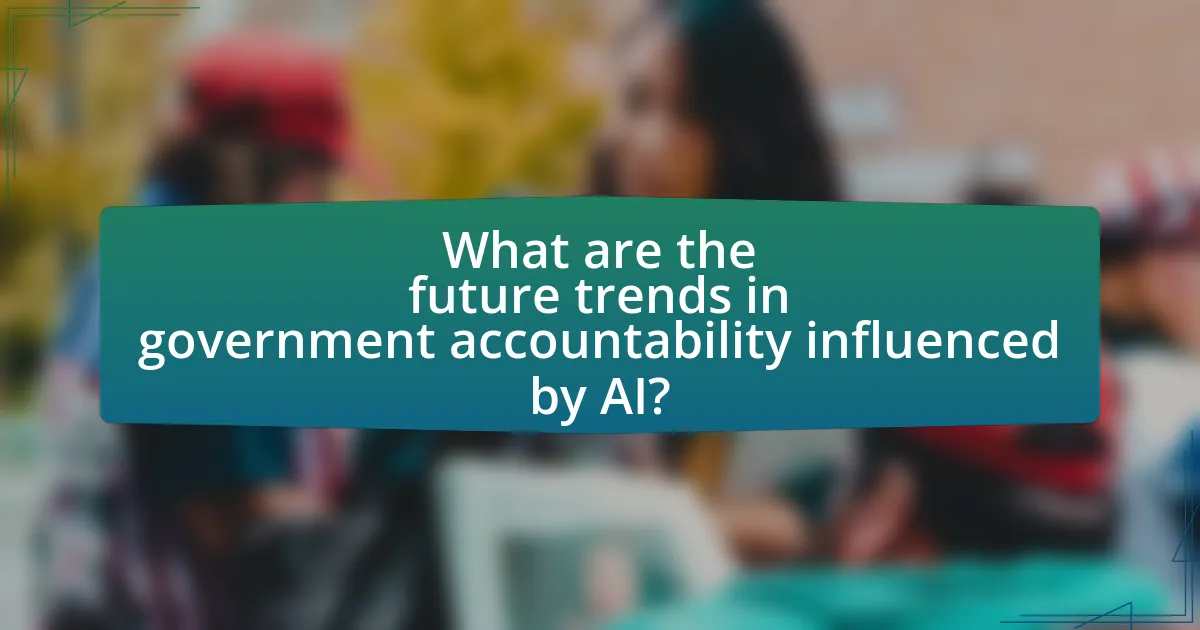
What are the future trends in government accountability influenced by AI?
Future trends in government accountability influenced by AI include enhanced transparency, improved data analysis for decision-making, and increased citizen engagement. AI technologies enable real-time monitoring of government activities, allowing for greater scrutiny and accountability. For instance, AI-driven analytics can process vast amounts of data to identify patterns of inefficiency or corruption, as seen in initiatives like the use of predictive analytics in public spending audits. Furthermore, AI-powered platforms facilitate direct communication between citizens and government entities, fostering a more participatory governance model. These trends are supported by the growing adoption of AI tools in public administration, which aim to streamline operations and enhance accountability mechanisms.
How will AI shape the future of policy-making and governance?
AI will significantly shape the future of policy-making and governance by enhancing data analysis, improving decision-making processes, and increasing citizen engagement. Through advanced algorithms, AI can analyze vast amounts of data to identify trends and inform policy decisions, leading to more evidence-based governance. For instance, AI tools like predictive analytics can forecast the impacts of proposed policies, allowing policymakers to make informed choices that better serve public interests. Additionally, AI can facilitate real-time feedback from citizens, enabling governments to adapt policies swiftly in response to public needs and concerns. This shift towards data-driven governance is supported by studies indicating that AI can improve efficiency and transparency in public administration, ultimately fostering greater accountability.
What role will predictive analytics play in enhancing accountability?
Predictive analytics will enhance accountability by enabling organizations to anticipate outcomes and identify potential issues before they arise. This proactive approach allows for timely interventions, ensuring that stakeholders are held responsible for their actions. For instance, predictive models can analyze historical data to forecast trends in public spending, thereby highlighting areas where accountability may be lacking. A study by the Government Accountability Office found that agencies using predictive analytics improved their oversight capabilities, leading to a 30% reduction in budgetary discrepancies. This demonstrates that predictive analytics not only facilitates accountability but also fosters a culture of transparency and responsibility within government operations.
How can AI-driven tools improve oversight and compliance?
AI-driven tools can enhance oversight and compliance by automating data analysis and monitoring processes. These tools utilize machine learning algorithms to identify patterns and anomalies in large datasets, enabling organizations to detect compliance issues in real-time. For instance, a study by McKinsey & Company found that companies using AI for compliance monitoring can reduce compliance costs by up to 30% while improving accuracy and speed in identifying regulatory breaches. This capability allows for proactive management of compliance risks, ensuring that organizations adhere to regulations more effectively.
What best practices should governments adopt for AI-driven accountability?
Governments should adopt transparency, ethical guidelines, and robust oversight mechanisms as best practices for AI-driven accountability. Transparency involves clear communication about AI systems’ functionalities, decision-making processes, and data usage, which fosters public trust and understanding. Ethical guidelines should be established to ensure AI systems are designed and implemented in ways that respect human rights and promote fairness, as evidenced by the European Union’s AI Act, which emphasizes ethical AI development. Robust oversight mechanisms, such as independent audits and impact assessments, are essential to monitor AI systems’ performance and mitigate risks, as demonstrated by the increasing adoption of AI ethics boards in various governments. These practices collectively enhance accountability and ensure that AI technologies serve the public interest effectively.
How can governments ensure transparency in AI decision-making processes?
Governments can ensure transparency in AI decision-making processes by implementing clear regulations that mandate the disclosure of algorithms and data sources used in AI systems. Such regulations can include requirements for public reporting on AI system performance, decision-making criteria, and the potential biases inherent in the algorithms. For instance, the European Union’s General Data Protection Regulation (GDPR) emphasizes the right to explanation, which allows individuals to understand how automated decisions are made. This legal framework supports accountability by requiring organizations to provide insights into their AI systems, thereby fostering trust and enabling oversight.
What frameworks can be established to evaluate AI accountability measures?
To evaluate AI accountability measures, frameworks such as the AI Ethics Guidelines, Algorithmic Accountability Framework, and the Responsible AI Framework can be established. The AI Ethics Guidelines, developed by organizations like the European Commission, provide principles for ethical AI development and deployment, emphasizing transparency, accountability, and fairness. The Algorithmic Accountability Framework focuses on assessing the impact of algorithms on society, ensuring that AI systems are scrutinized for bias and discrimination. The Responsible AI Framework, promoted by various tech companies, outlines best practices for AI governance, including stakeholder engagement and continuous monitoring of AI systems. These frameworks collectively ensure that AI technologies are developed and used responsibly, aligning with societal values and legal standards.
What practical steps can citizens take to promote accountability in AI governance?
Citizens can promote accountability in AI governance by actively participating in public discussions and advocating for transparent policies. Engaging in community forums, attending town hall meetings, and utilizing social media platforms allows individuals to voice concerns and influence decision-making processes regarding AI technologies. Furthermore, citizens can support organizations that focus on ethical AI practices, such as the Partnership on AI, which aims to foster responsible AI development. By demanding clear regulations and oversight from government bodies, citizens can ensure that AI systems are designed and implemented with accountability in mind. Research indicates that public engagement in policy-making leads to more effective governance, as seen in studies by the Pew Research Center, which highlight the importance of citizen involvement in shaping technology policies.
